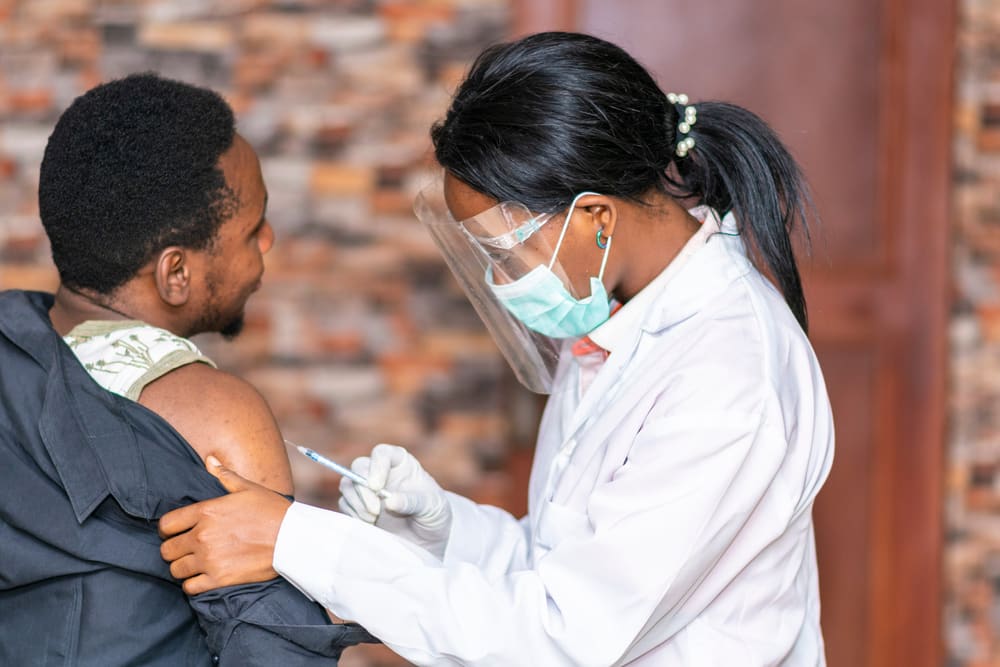A year after the creation of the mRNA Vaccine Technology Transfer Hub, two biotech companies – Afrigen Biologics and the Univercells Group – are set to work together.
The agreement intends to pave the way for the development of the first African-owned COVID-19 vaccine. The collaboration will focus on the development of a novel mRNA vaccine using intellectual property from the collaboration partners, as well as developing new IP, and is intended to supercharge access to the vaccine. Afrigen, based in South Africa, and Belgium’s Univercells will be supported in the collaboration by mRNA specialist eTheRNA.
The companies will collectively tackle two major challenges that have hampered the rollout of COVID-19 vaccines in Africa and other low- and middle-income countries (LMICs): lack of local cost-effective production, and the need for cold- or super-cold chains.
At present, African countries import 99% of all the vaccines that they use. This lack of local production has contributed to challenges in COVID-19 vaccine rollout where, although more than 60% of the global population has been fully vaccinated, some LMICs are yet to deliver even a single dose to 1% of their population. An African-owned COVID-19 vaccine is considered a critical step to closing this gap.
Also, cold chain storage and distribution, especially the super-cold chains required for existing mRNA vaccines, are expensive and create a logistical challenge for many countries. The agreement paves the way for the production of an mRNA vaccine that is thermostable at temperatures used in regular refrigerators, making it easier to store and distribute in rural and remote locations where fewest people are currently vaccinated.
LMIC access
Afrigen will host the new collaboration at its Cape Town sites. Afrigen hosts the World Health Organization’s (WHO) Global mRNA Vaccine Technology Transfer Hub and is working to facilitate production of mRNA vaccines at more than 15 designated manufacturing sites in LMICs across the world.
Petro Terblanche, Afrigen managing director, said: “The COVID-19 pandemic has shown that there is a pressing need to build African capabilities in vaccine development and manufacturing. Without the capacity to make their own vaccines, too many countries haven’t been able to access them. This agreement is an important step towards ensuring that everyone, everywhere – in Africa, and across LMICs – has access to life-saving vaccines and medicines.”
New manufacturing model
In addition to developing a novel vaccine, the collaboration intends to pioneer a new model of manufacturing for mRNA vaccines. Quantoom Biosciences, a Univercells company, is developing an mRNA production technology that encompasses all the steps of RNA production, from sequence construct to large scale production, allowing for rapid growth and scale-up.
Far more efficient than existing methods, it was built with distributed and de-centralized manufacturing in mind – ensuring processes can be easily transferred across LMICs. The system is designed to support the expansion of capacity and enables production at a large scale – allowing for rapid growth and scale-up.
By working with eTheRNA, the COVID vaccine produced on the Univercells system will have improved thermostability, which is critically important in LMICs.
“Failing millions”
Martin Friede, vaccines and biologicals at the WHO, said, “The WHO mRNA Technology Transfer Hub is designed to establish and share know-how on mRNA vaccines with LMICs globally. It will increase the capacity of LMICs to be self-sufficient in terms of outbreak response, and enables the addressing of regional needs through R&D.
“This unique partnership model enables the sharing of information, technology and human capital, and has potential to shape vaccine production worldwide. The WHO and its partners are committed to ensuring that we build robust systems to further the cause of vaccine equity and access.”
José Castillo, co-founder of Univercells Group and CEO of Quantoom Biosciences, said: “The existing global model for vaccine manufacturing has failed millions of people during the pandemic. We believe a new model is needed where manufacturers are not locked-in to any individual product but have technology which enables them to manufacture the right vaccine or medicine at the right time.
“Our system, which was initially developed with funding from the Bill & Melinda Gates Foundation, is built with this flexibility in mind. The foundation has provided funding to Univercells for many years to support the development of biomanufacturing solutions that promote affordability and autonomy. We are delighted to work with our partners to produce a truly free-to-operate mRNA vaccine platform.”
Cover image: Shutterstock





